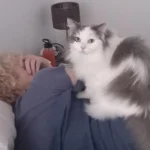A powerful movement is growing across the UK as thousands rally behind a petition demanding legal changes that would require drivers to report incidents of hitting cat on roadways. Currently, motorists must stop and report collisions with animals like dogs and horses, yet cats remain strangely excluded from these protections.
The Personal Cost of Current Laws
Image by pexels
For Kellie Watson, the devastating reality of current legislation became clear when her kitten Martha didn’t greet her at the door as usual after work. The 47-year-old Killingworth resident soon discovered her beloved pet had been repeatedly run over. A compassionate stranger eventually took the severely injured kitten to a veterinary clinic, but Martha’s injuries proved fatal. Most heartbreaking for Watson was being unable to say goodbye due to the severity of Martha’s head injuries.
The impact extended beyond just Watson’s grief. Her 18-year-old cat has been visibly distressed since Martha’s death. “She’s not eating, being sick, because she mothered her,” Watson explained. This situation highlights how hitting cat incidents affect entire households, including other pets who form strong bonds with their companions.
Legal Disparities in Animal Protection
The current road traffic framework creates what many see as an unfair double standard. Drivers in the UK must stop and report collisions with dogs, horses, cattle, pigs, goats, sheep, donkeys, and mules. Cats, despite being one of Britain’s most popular pets, receive no such protection. “I can’t understand drivers just hitting a cat and just leaving them in the middle of the road,” Watson noted. “You wouldn’t do that with a dog, so why do that with cats?”
The petition directly addresses this inequality, arguing that the time has come to extend the same legal protections to feline companions. This sentiment resonates strongly with thousands of cat owners who believe their pets deserve equal consideration under traffic laws. The emotional and financial investment in pets doesn’t discriminate by species, yet current laws do exactly that.
Growing Support from Organizations
Image by pexels
Local charity Pawz for Thought has thrown its full support behind the petition. Operations manager Lorraine Thornton highlighted the organization’s regular encounters with distraught pet owners. “We constantly receive calls from heartbroken owners searching for their missing cats,” she explained. The charity believes mandatory reporting after hitting cat incidents could provide vital closure to families rather than leaving them searching indefinitely.
Animal welfare advocates emphasize that cats are family members for many people. “Our pets are part of our family and for some people their only family,” Thornton noted. This perspective underscores the deep emotional bonds that make current reporting disparities so painful for cat owners.
Government Response and Future Outlook
Despite growing public support, the Department for Transport has indicated no immediate plans to change existing legislation. Officials point to recent microchipping regulations implemented in June 2024, which require all cats over 20 weeks old in England to be microchipped and registered on a compliant database.
The Department suggests these rules will “make it easier for National Highways and local authorities to reunite cats with their keepers.” However, advocates argue microchipping alone doesn’t address the fundamental issue of unreported hitting cat incidents, where injured cats may suffer unnecessarily or deceased cats may never be recovered by grieving owners.
With tens of thousands of signatures already collected, Watson and her supporters remain hopeful that continued pressure might eventually lead to meaningful change that acknowledges cats as family members deserving the same protections as other animals on Britain’s roadways.






